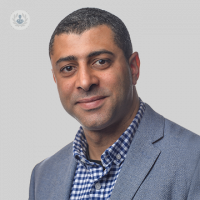Ask a top dentist: gum disease, bad breath and cosmetic dentistry
Written in association with:Here at Top Doctors, we like to take the opportunity to ask our experts some of your most desired questions. We sat down with leading London dentist Mr Ali Abdellatif and asked him to explain the causes of bad breath, which is something that we are all prone to and how our overall health is linked to the wellbeing of our gum health.

What causes bad breath?
There are many reasons to have bad breath with the most common being gum disease. A lot of people brush their teeth day and night to try and get rid of halitosis (a bad odour) and do not realise that they are missing certain areas.
They might have buried wisdom teeth with areas of infection around them and they just can't get rid of them. One of the best ways to control your bad breath is to see a dentist or a dental hygienist, which should be the first thing you do.
There are, of course, other reasons for bad breath such as medical conditions. Some people are on certain medications that change body chemistry and produces bad breath. Another obvious cause of bad breath and also the most well-known reason is what you eat. With some foods, such as onions or garlic or tuna, the odour is usually temporary. If you have a chronic problem it is usually due to an underlying cause that is medical or dental and you should visit a hygienist.
How does overall health affect gum health?
Gum health can vary depending on the systemic health of a patient and the keyword nowadays that is used is inflammation, which means the redness, or hotness, or elevated body temperature. The general systemic condition of the patient, such as how much inflammation they have in their whole body, can affect how their gums react to the bacteria sitting on them.
There's no doubt that the presence of the bacteria close to the gums will cause inflammation but it can be increased and exaggerated if the patient's general health has something wrong or is elevated in terms of inflammation.
Sometimes we examine patients and find that they have a lot of bleeding gums and it looks a little bit disproportional to the number of bacteria that there are and so we think about other conditions. Maybe the patient is diabetic, maybe they are under a lot of stress or maybe they have a high sugar intake. It could be diet, stress or several other factors. In addition to that, people who have gum disease can create a state of high inflammation in the body.
If people who don't brush their teeth, for example, have areas of infection around their teeth or their gums as a problem that they don't address, it can affect the rest of the body and create that state of inflammation in the whole body. Latest research has begun to point to the fact that this can affect other body systems including the heart.
What are aggressive cosmetic dental treatments? Why should they be avoided?
Cosmetic dentistry is a wide range of dentistry that focuses on the appearance of teeth. It is very important that the cosmetic procedures that somebody visits a dentist for, is appropriate for their age and condition of their teeth.
Around 10-15 years ago, a lot of cosmetic dentistry focused on aggressively shaving teeth for veneers and crowns and to make them look spectacular. This was very short-sighted because it can create a lot of damage and can lead to the death of the tooth, resulting in a root canal or ultimately the extraction of the tooth.
Nowadays, we're a lot more careful with who we treat. We take into consideration their age, the condition of their teeth and we do less invasive things such as whitening or bonding, which is the application of aesthetic dental materials to the teeth by glueing them on.
Rather than shaving teeth, we now focus on attaching these materials and polishing them up. There are fantastic systems that can straighten teeth almost invisibly and later in life when somebody has strong, resilient teeth and have already had fillings or crowns, we can then consider things like veneers or new flash crowns. This is rather than in younger life where, overall, it can be quite damaging.
If you would like to discuss any of the above-mentioned topics with regards to your own gum and tooth health, do not hesitate to book an appointment with Mr Abdellatif in either of his clinics; Regency House Dental Clinic or Devonshire Dental Centre now.


